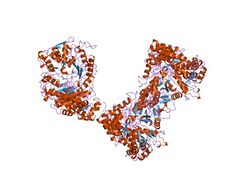Biology:ATP cone
| ATP-cone | |||||||||
|---|---|---|---|---|---|---|---|---|---|
 ribonucleotide reductase e441q mutant r1 protein from escherichia coli | |||||||||
| Identifiers | |||||||||
| Symbol | ATP-cone | ||||||||
| Pfam | PF03477 | ||||||||
| InterPro | IPR005144 | ||||||||
| SCOP2 | 7r1r / SCOPe / SUPFAM | ||||||||
| |||||||||
In molecular biology, the ATP-cone is an evolutionarily mobile, ATP-binding regulatory domain which is found in a variety of proteins including ribonucleotide reductases, phosphoglycerate kinases and transcriptional regulators.[1]
In ribonucleotide reductase protein R1 from Escherichia coli this domain is located at the N terminus, and is composed mostly of helices.[2] It forms part of the allosteric effector region and contains the general allosteric activity site in a cleft located at the tip of the N-terminal region.[3] This site binds either ATP (activating) or dATP (inhibitory), with the base bound in a hydrophobic pocket and the phosphates bound to basic residues. Substrate binding to this site is thought to affect enzyme activity by altering the relative positions of the two subunits of ribonucleotide reductase.
The ATP-cone domain also is a key part of NrdR, that controls transcription of ribonucleotide reductases in bacteria, in response to ATP and dATP levels. [4]
References
- ↑ "The ATP-cone: an evolutionarily mobile, ATP-binding regulatory domain". J. Mol. Microbiol. Biotechnol. 2 (2): 191–4. April 2000. PMID 10939243.
- ↑ "Structure of ribonucleotide reductase protein R1". Nature 370 (6490): 533–9. August 1994. doi:10.1038/370533a0. PMID 8052308.
- ↑ "Binding of allosteric effectors to ribonucleotide reductase protein R1: reduction of active-site cysteines promotes substrate binding". Structure 5 (8): 1077–92. August 1997. doi:10.1016/S0969-2126(97)00259-1. PMID 9309223.
- ↑ Rozman Grinberg, Inna; Martínez-Carranza, Markel; Bimai, Ornella; Nouaïria, Ghada; Shahid, Saher; Lundin, Daniel; Logan, Derek T.; Sjöberg, Britt-Marie et al. (2022-05-16). "A nucleotide-sensing oligomerization mechanism that controls NrdR-dependent transcription of ribonucleotide reductases" (in en). Nature Communications 13 (1). doi:10.1038/s41467-022-30328-1. ISSN 2041-1723. PMID 35577776. PMC 9110341. https://www.nature.com/articles/s41467-022-30328-1.
 |
